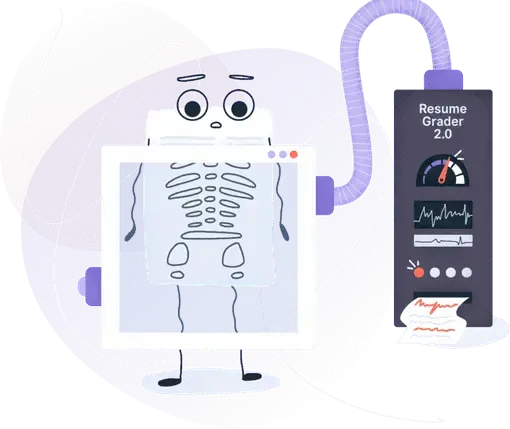Mainframe Skills: Example Usage on Resumes, Skill Set & Top Keywords in 2025
Listing mainframe expertise on your resume suggests to recruiters that you possess a solid grounding in legacy systems, often reflecting a detail-oriented and reliable character. Dive into the guide below to revitalize your resume with potent synonyms and alternative skill descriptions.


Is your resume ATS-friendly?
Drop your resume here or upload a file to find out if the skills in your resume are readable by an ATS.
Mainframe skills refer to the ability to work with large-scale, high-performance computing systems that are used primarily by large organizations for critical applications, bulk data processing such as census, industry and consumer statistics, enterprise resource planning, and transaction processing. Having mainframe skills on your resume shows potential employers that you are capable of handling large and complex computing environments, which often support vast amounts of data and high transaction volumes that are critical to the operations of major businesses and institutions.
However, listing mainframe skills on your resume might suggest that you are specialized in outdated technology, as more modern employers may prioritize knowledge of cloud computing or distributed systems architecture. While mainframes are still in use and highly relevant in certain industries such as banking and insurance, it may not be beneficial if you are looking to work in emerging tech fields. Instead of focusing solely on mainframe expertise, it might be more advantageous to also showcase skills in newer technologies, such as cloud services, to demonstrate your versatility and adaptability to evolving tech environments.
In this article, you will learn:
- The potential drawbacks of highlighting mainframe skills on your resume.
- How to balance mainframe expertise with knowledge of current technologies.
- Ways to rephrase 'mainframe skills' to appeal to a broader range of employers.
Misusage of mainframe on resumes
Emphasizing your mainframe expertise in your resume can set you apart, but it's crucial to do so accurately and relevantly. Misrepresenting your skills or including them inappropriately can raise red flags for potential employers and may lead to missed job opportunities.
Summary Section Misuse:
- "Guru of all things mainframe, with unmatched prowess in mainframe management that outshines competition."
Experience Section Misuse:
- Listed "Revolutionized mainframe processing" at a job where you performed routine maintenance and updates without making significant changes.
Achievements Section Misuse:
- Cited "Spearheaded a mainframe overhaul that doubled efficiency," when in reality you assisted a team that led the initiative, without being the project leader.
How to demonstrate mainframe skills on your resume
- List your specific mainframe skills, such as COBOL, CICS, JCL, DB2, or IMS, detailing experience levels and any significant projects or contributions you made using these technologies.
- Highlight any mainframe-related certifications you've attained, such as IBM Certified System Programmer or Database Administrator, to show formal recognition of your skills.
- Show experience with mainframe tools and utilities like TSO/ISPF, RACF, or z/OS Connect, reflecting your ability to effectively work with mainframe environments.
- Detail any achievements in performance tuning, system optimization, or problem-solving on the mainframe to exhibit your ability to improve and maintain mainframe operations.
- Include a section on your resume about your experience with mainframe migration, upgrades, or modernization initiatives, demonstrating your capacity to adapt and improve legacy systems.
Example 1: Demonstrate mainframe in the experience section
- •Developed and implemented a new mainframe transaction processing system, reducing batch processing time by 30%.
- •Collaborated with cross-functional teams to integrate mainframe services with cloud storage solutions, enhancing system reliability and accessibility.
- •Led the transition of legacy COBOL applications to modern Java-based platforms, resulting in increased performance and reduced maintenance costs.
- •Orchestrated a major data migration from outdated systems to an IBM z15 mainframe, securing sensitive information and improving data processing speeds by 25%.
- •Spearheaded training programs for junior developers on mainframe best practices, significantly improving team efficiency and code quality.
- •Performed systematic analysis of mainframe systems to identify bottlenecks, leading to a 20% increase in transaction processing speeds.
- •Managed the upgrade of mainframe hardware, which provided a more reliable platform for end-of-day financial batch runs and cut downtime by 40%.
- •Authored a comprehensive mainframe disaster recovery plan, ensuring continuity of operations and minimal service disruption during critical situations.
- •Executed mainframe capacity planning activities, enabling the organization to handle a projected 50% growth in online transaction volumes.
- •Directed a 24/7 mainframe operations team, consistently achieving system uptimes exceeding 99.9%.
- •Initiated a predictive maintenance program for mainframe hardware, slashing unplanned downtime by half and saving $200,000 annually in operational costs.
- •Coordinated with software vendors to refine mainframe application performance, leading to faster turnaround times for customer service requests.
- This work experience section clearly shows the applicant's responsibilities and accomplishments in the field of mainframe computing.
- Each bullet point highlights specific skills used and outcomes achieved that are directly tied to important business goals.
- Quantifiable results, such as improved processing times and reduced downtime, provide a tangible measure of the applicant's contributions.
- The diversity of roles within mainframe-related positions illustrates a broad and progressive experience in this line of work.
- Recent dates and reputable companies lend credibility and context to the applicant's claimed skills.
Example 2: Demonstrate mainframe in the summary section
- The summary clearly indicates over ten years of hands-on mainframe experience, which highlights a solid background in the field.
- It showcases specific technical skills relevant to mainframes, such as COBOL, JCL, CICS, and DB2, which are critical for the job.
- Concise mention of a significant career achievement provides concrete evidence of the applicant's capability to deliver positive outcomes.
- Describing the applicant's involvement in the redesign and efficiency improvement of a workflow demonstrates problem-solving skills and impact.
- The summary avoids cliches and buzzwords, which makes the experience and skills stand out more authentically.
- Writing is direct and to the point, allowing the reader to effortlessly grasp the applicant’s qualifications and potential value to the organization.
Example 3: Demonstrate mainframe in the achievements section
- The titles are concise and directly related to mainframe expertise.
- Descriptions contain measurable improvements and outcomes, offering proof of the skills.
- Practical examples from work experiences show a clear application of skills.
- There's no use of unnecessary jargon or buzzwords, making it accessible to all readers.
- The skill is evident through descriptions of specific tasks and results.
What are the relevant certifications for mainframe skills on resume
If you're aiming to bolster your mainframe credentials, these certifications can be particularly beneficial:
The top 5 certifications for gaining mainframe skills expertise:
Top skills people add together with mainframe skill on resume:
COBOL
JCL
CICS
DB2
IMS DB/DC
z/OS
RACF
VSAM
Assembler
PL/I
Problem-solving
Attention to detail
Critical thinking
Teamwork
Adaptability
Organization
Time management
Communication
Leadership
Learning agility
Patience
Most relevant jobs for mainframe skills
Mainframe skills are highly valued in roles responsible for the operation, maintenance, and development of large-scale computing environments. Professionals in this area ensure the reliability, security, and efficiency of mainframe systems which are crucial for sectors like finance, insurance, and government. With a combination of technical expertise and problem-solving abilities, these jobs involve managing some of the most powerful computing resources today.
- Mainframe developer
- Systems programmer
- Database administrator
- Systems analyst
- COBOL programmer
- IT consultant
- Technical support specialist
- Performance analyst
- Capacity planner
- Operations analyst
Key takeaways
- Mainframe skills can significantly boost your resume by showcasing your ability to work with large-scale computing systems.
- Avoid misuse of mainframe expertise by staying updated with best practices and applying the skill correctly across various applications.
- Showcase mainframe abilities on your resume by listing relevant experience, certifications, and specific projects that highlight your proficiency.
Make one that's truly you.




